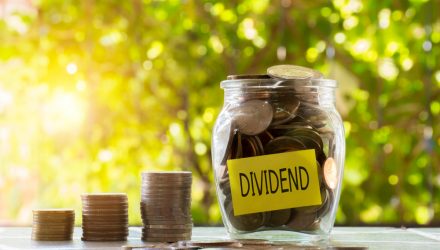With 2020 ranking as a rough year for dividend investors, payout growth strategies focusing on quality, such as the ProShares S&P 500 Aristocrats ETF (CBOE: NOBL), are increasingly important in income-oriented portfolios.
NOBL tracks the S&P 500 Dividend Aristocrats Index, targets the cream of the crop, only selecting components that have increased their dividends for at least 25 consecutive years. Consequently, investors are left with a portfolio of high-quality, sustainable dividend payers.
This year, just 74 S&P 500 companies boosted payouts compared to 56 that either cut or suspended dividends.
“There is an elite group of companies that have been less susceptible to dividend cuts this year. So far, just one company among the S&P 500® Dividend Aristocrats® Index has cut its dividend,” said ProShares in a recent note. “To become a Dividend Aristocrat, an S&P 500 company has to increase its dividends for a minimum of 25 consecutive years. Many of the Dividend Aristocrats have actually raised their dividends continuously for 40 years, 50 years or more. This is relevant for today’s investors because that 25-year minimum requirement means the Dividend Aristocrats have increased their dividends even through the Great Recession, the bursting of the Dot-com bubble, and many more market disruptions.”
Favorable NOBL Traits
For long-term investors, particularly those with a time frame that can indulge reinvesting dividends, payout growth can have a substantial, positive impact on total returns, underscoring the point that dividend growth matters.
Many of NOBL’s components carry investment-grade credit ratings, another important factor for dividend investors to consider.
“The S&P 500 Dividend Aristocrats Index has a high distribution of companies among the top two quintiles by credit rating,” notes ProShares. “This attribute of overall higher credit quality has been closely associated with dividend resiliency during previous market disruptions. And as 2020 results indicate so far, it may support similar resiliency in today’s pandemic-driven market.”
Rampant dividend cutting against the backdrop of the coronavirus makes it difficult for many investors to remember that dividend stocks usually less volatile and often outperform their non-dividend counterparts in turbulent environments. NOBL also offers benefits relative to high dividend funds, many of which feature exposure to financially strained companies.
“If there is a muted pandemic recovery, we believe it is much more likely to cause a disruption in their cash flow and ability to continue paying high dividends,” notes ProShares. “Moreover, a longer-term look at dividend growers versus high yielders highlights that the benefits of higher yield have tended to dissipate over time.”
For more alternative investing ideas, visit our Alternatives Channel.
The opinions and forecasts expressed herein are solely those of Tom Lydon, and may not actually come to pass. Information on this site should not be used or construed as an offer to sell, a solicitation of an offer to buy, or a recommendation for any product.








